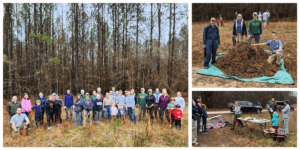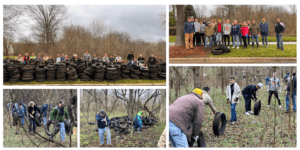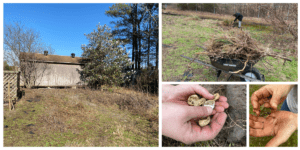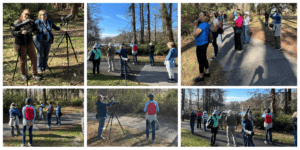Digging in the Dirt: February Chapter & Planting Highlights

February chapter and planting highlights
North Carolina Wildlife Federation staff and Community Wildlife Chapter volunteers did a whole lot of environmental educating, wildlife watching, trail hiking, habitat restoring and more in January to promote healthy wildlife habitat and inspire people to get outside.
In total, 100-plus volunteers removed over 20 thousand pounds of trash and over 300 people were given the opportunity to connect with nature through one of NCWF’s various opportunities.
Thanks to partners such as the Duke Energy Foundation, Jandy Ammons Foundation and Burt’s Bees for helping make these habitat restorations, educational programs and nature outings possible. Explore our Events Calendar to discover where NCWF and our Community Wildlife Chapters are hosting in-person and virtual events near you. Check out a few highlights below from our conservation outreach team.

Shortleaf Pine Tree Planting at Turnipseed Nature Preserve, Jan 31. The North Carolina Wildlife Federation partnered with Wake County Parks, Recreation and Open Space to plant 75 shortleaf pine trees (Pinus echinata) thanks to the help of 32 volunteers. Afterwards, the crew helped tackle the invasive periwinkle (Vinca minor) that has been running rampant throughout the preserve.

ecoEXPLORE Ornithology Badge Check-In, Feb 7. The North Carolina Wildlife Federation, Pocosin Lakes National Wildlife Refuge and Tyrrell County Public Library teamed up to present monthly ecoEXPLORE programs for children in and around Columbia, NC. The ecoEXPLORE initiative encourages kids to explore the outdoors and participate in citizen science.

Fort Anderson Habitat Cleanup, Feb 11. Island Wildlife volunteers embraced the rain and picked up 64 pounds of trash at Brunswick Town / Fort Anderson. Based on this effort, NCWF will plant two native trees as a part of their Clean and Green initiative where a native tree is planted for every 25 pounds of litter removed.

Bass Lake Waterfowl Walk, Feb 11. The South Wake Conservationists kept their eyes peeled as they walked around Bass Lake in Holly Springs searching for wintering waterfowl. Led by an avid local birder, the group spotted an abundance of species including American coots, buffleheads, cormorants and ruddy ducks. They also identified several year-round residents such as bald eagles, great blue herons, mallards, red-tailed hawks, numerous songbird species and even a barred owl calling in the distance.

Millbrook Elementary Pollinator Garden Workday, Feb 21. The South Wake Conservationists kept their gardening hot streak alive with another visit to Millbrook Magnet Elementary School in Raleigh. The group filled several wheelbarrows with dead-headed plant material and successfully prepared the garden for spring growth.

Nature Walk on the Neuse River Trail, Feb 22. The Neuse River Hawks continued their “Year of the Trail” initiative by embarking on a nature walk along the Neuse River Trail in Raleigh. 22 participants enjoyed scenic views of the river and boardwalk areas through wetlands.

Decorate a Spring Flower Pot, Feb 22. The North Carolina Wildlife Federation continued their flourishing partnership with Pocosin Arts School of Fine Craft and Pocosin Lakes National Wildlife Refuge. This event gave participants the fun opportunity to decorate a spring flower pot, learn more about native plant species and even take home a free packet of native seeds courtesy of NCWF.

Tire Dump Cleanup, Feb 25. Marvin Area for the Restoration and Sustainability of Wildlife Habitat (MARSH) brought together over 30 volunteers to remove and recycle a whopping 19,450 pounds worth of tires from the McBride Branch wetlands, an area full of wildlife and natural beauty. Over 760 trees will be planted through NCWF’s Clean and Green initiative as a direct result of these efforts.

Lillington Litter Sweep, Feb 25. The South Wake Conservationists spent the morning making a direct impact on the habitat and wildlife of the Upper Little River, a wild and scenic river that feeds into the Cape Fear River a mile downstream. The group removed over 800 pounds of trash and enjoyed the satisfaction of meaningful environmental stewardship.

Latta Preserve Fairy House Festival, Feb 25. NCWF’s Charlotte Wildlife Stewards joined Mecklenburg County Parks and Recreation at Latta Preserve’s annual celebration of nature! The kids made balls of nesting material to put in their backyard for native birds to use and keep their hatchlings warm and cozy as they grow.

Pollinator Garden Workday at the Red Wolf Center, Feb 25. The North Carolina Wildlife Federation and Pocosin Lakes National Wildlife Refuge joined together for a garden workday at the Red Wolf Center in Columbia. Native pollinator gardens create vital wildlife habitat and raise awareness for the importance of native plant species on the landscape.

Greenfield Lake Bird Walk, Feb 28. Birders united on a warm February morning to enjoy a guided bird walk around Greenfield Lake in Wilmington, NC hosted by Island Wildlife in partnership with Cape Fear Bird Observatory. The group basked in the anticipation of spring and spotted a wide variety of bird species including ospreys, white ibises, downy woodpeckers, pied-billed grebes, yellow-throated warblers, anhingas and more!

